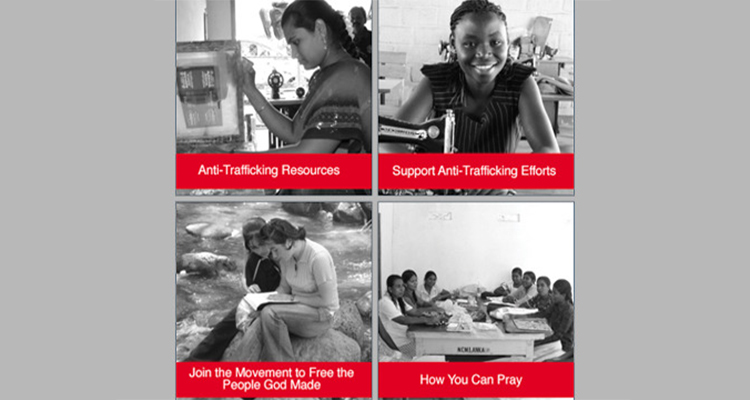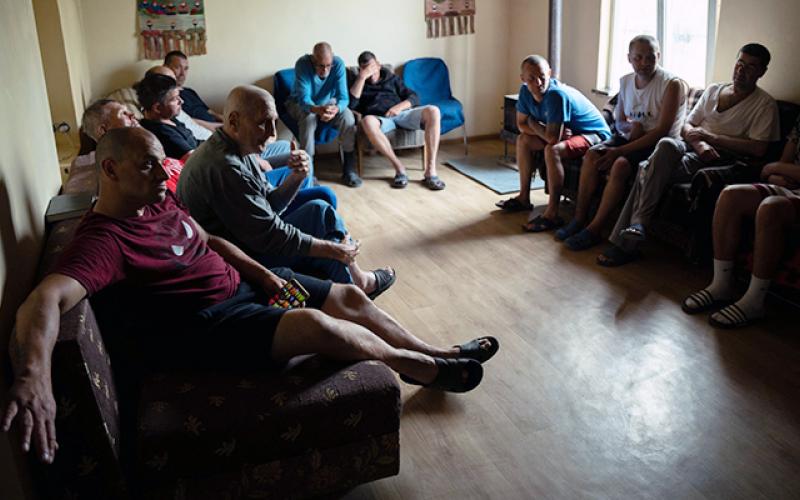
General superintendents endorse formal statement on human trafficking

The Board of General Superintendents announced its endorsement of the "Declaration for Freedom," a formal statement on human trafficking created through the Freedom Network of the Wesleyan Holiness Consortium.
The Consortium is a network of Wesleyan-Holiness denominations, including the Church of the Nazarene. Its declaration calls the church to "respond faithfully to the prophetic imperative for justice that beckons every generation to act justly, love mercy, and walk humbly before our God, by entering in Christ-like ways into a movement for the abolition of modern slavery and trafficking."
In announcing its support for the declaration, the Board of General Superintendents wrote:
Together with our Wesleyan-Holiness sister denominations, we recognize the growing need for church response and support to address the problem of human trafficking throughout our world.
Human trafficking is a form of modern-day slavery whereby children, women, and men are forced, coerced, stolen, or exploited into labor, which includes factory work, domestic service, and the commercial sex industry.
The Church of the Nazarene is committed to raising awareness, taking a stand, and working to alleviate suffering for those who fall prey to human trafficking. We acknowledge that human trafficking is a sinful practice, and we join with other Christians globally to seek freedom for those who are vulnerable and held captive by this industry.
We unite in support of the Declaration of Freedom drafted by the Wesleyan Holiness Consortium. We encourage you to read the statement and prayerfully consider how you and your congregations can help combat human trafficking.
The Church of the Nazarene has put words into action as the denomination is engaged in a variety of efforts to address the problem of human trafficking on both local and global levels. Recently, Monica Boseff, a Nazarene pastor in Romania, was awarded the U.S. Department of State's Trafficking in Persons Hero distinction for her work with The Open Door Foundation, the only emergency shelter for victims of sex trafficking that exists in Romania. In the U.S., Pastor Rondy Smith and the Hermitage, Tennessee, Church of the Nazarene have been working to open Rest Stop Ministries, a rehabilitation center and shelter for trafficking survivors.
The majority of the church's work focuses on early intervention and prevention of human trafficking altogether. Around the world, Nazarene Compassionate Ministries facilitates anti-trafficking education for children and families. On the Commonwealth of Independent States (CIS) Field, for example, child development ministries such as Kids Clubs are integrating prevention education into their curriculum.
Andriy Takhtay, NCM coordinator for the CIS Field, said the goal is to teach four principles:
- Every child is special because every child is made in God's image.
- Every person can set and achieve goals with God through education and hard work.
- Good choices lead to a life of freedom.
- Every child needs to know his or her rights in order to be protected.
In the Philippines, Asia-Pacific Nazarene Theological Seminary and NCM combat trafficking through a program called STEP-UP, which focuses on both rehabilitating victims of trafficking and preventing trafficking among at-risk youth through job skills training.
Additionally, NCM supports an initiative in Zimbabwe called Women at Risk, designed to create awareness about the ways women and girls are often lured into trafficking by promises of a better life elsewhere.
Stephen Phillips, who serves as the human trafficking and gender-based violence coordinator for NCM in Africa, said that understanding — and addressing — the connection between poverty and trafficking is critical.
"Poverty is one of the root causes of human trafficking," Phillips said. "People who live in poverty can often be easily misled in the hope for a better future … People who live in poverty are often desperate and always looking for a way out. When a way out is provided, it may sound too good to be true, but nonetheless they believe it, thinking, 'It can't be worse than where I am now with no food.'"
The Church of the Nazarene is working around the world to reduce the risk of poverty-induced trafficking through women's self-help groups, microenterprise development, skills training, food security efforts, education, and more. Beyond addressing the issue of material lack, the denomination is also combatting trafficking by reminding individuals of their value as children of God.
"Many people would say that our goal is to be the voice of the voiceless, but God has given everyone a voice," Phillips said. "We can only remind people of this voice by reminding them of who they are in Christ."
Learn more about how to support anti-trafficking efforts at ncm.org/trafficking.
For the full "Declaration for Freedom," click here (PDF).
--Nazarene Compassionate Ministries



